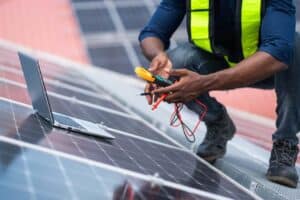People who can afford to are flocking to solar installers to get alternative sources of power, but keep the risks in mind when you decide.

If you have decided to have solar panels installed, you will be exposed to an increased fire risk that will affect your insurance. Imagine installing a R2.5 million solar operation to power your house, only to have a fire destroy your property.
“Fire is the very real risk property owners face when a solar power solution is not installed in line with regulations and South African National Standards (SANS),” says Tarina Vlok, MD of Elite Risk Acceptances, a subsidiary of Old Mutual Insure.
The ever-increasing cost of electricity and rolling blackouts due to Eskom’s ageing coal-fired generation infrastructure, combined with the tax rebate incentives announced in the February 2023 budget speech, has led to an exponential increase in the installation of residential solar photovoltaic (PV) solutions.
ALSO READ: All your questions about solar power answered
In the first quarter of 2023, South Africa imported solar panels to the value of R3.6 billion, almost as much as those imported during the whole of 2022. This represents an estimated additional 1 000 megawatts of solar capacity.
However, Vlok says, this also introduced risks and Old Mutual has noted more fire-related claims due to incorrect installations. She uses a recent claim to illustrate how devastating the consequences of solar panels gone wrong can be.
“The fire in this particular case was caused by the installation of charge controllers, which was done without a professionally authorised design document in accordance with the manufacturer’s instructions and the issuing of a certificate of compliance (CoC) which did not comply with the relevant SANS code 10142-1 that deals with the witing of installations,” says Vlok.
Consumers desperate for alternative power
Consumers are desperate for alternative power sources, but not everybody can afford to switch to solar panels, which are expensive to install. This can tempt consumers to settle for affordable solutions and installers without verified credentials, which may prove a very expensive decision later.
“The installation and management of solar PV systems is a complex and highly skilled undertaking, installed on top of your most expensive asset, your home. It is therefore important to ensure that the electrician can provide you with a CoC, which confirms that they complied with the rules and regulations in place to ensure safe installation.”
ALSO READ: Thumbs up to Lesufi’s solar bid
Vlok says it is also important to ensure that the electrician has the relevant proof of registration with the department of labour. This is also called a wireman’s license, which ensures that the electrician is proficient in the wiring codes of SANS 10142-1 and is permitted to issue the necessary CoC.
“When buying solar panels, buy the best quality that you can afford. With the huge capital investment that comes with investing in solar, the top tier offers better durability, unlike cheap imports that may be vulnerable to deterioration and wear and tear, which is not covered by insurance.”
She says other risks to be aware of include damage by weather-related causes such as or accidental damage and theft.
“It is therefore important to ensure that you include your solar installation for replacement costs on your buildings insurance to ensure you are not out of pocket if the installation is lost or damaged. Insurers have various responses to solar installation and you must ensure that you are fully aware of the cover, limitations, conditions and excesses associated with your solar PV system insurance.”
What to remember when opting for solar panels
Vlok says if you are a tenant, it is important to talk to your broker about the most appropriate insurance cover for your solar installation.
She urges consumers to:
- Ensure that your roof is well maintained without broken tiles or rust and ensure that all water damage and visible cracks are repaired before you have the solar system installed.
- Use an installer who is accredited by the South African Photovoltaic Industry Association’s (SAPVIA) PV GreenCard programme for solar installers.
- Buy the best quality solar panels you can afford.
- Get the required municipal approvals for solar systems. Your accredited installer will be able to assist you with the process.
- Increase the sum insured on your buildings insurance to cater for the replacement of your solar system.
- Continue to manage your electricity usage and try to save wherever you can.
- For tenants, ensure a watertight addendum with landlords is signed to remove any backup utilities should you move.
- Keep all your invoices and remember to claim back your tax rebate.
“For property owners, solar PV will likely increase the value of your property by 3-8% and make the property more attractive for potential buyers, not only for the uninterrupted supply of energy, but also in support of green energy solutions,” Vlok says.
Support Local Journalism
Add The Citizen as a Preferred Source on Google and follow us on Google News to see more of our trusted reporting in Google News and Top Stories.






